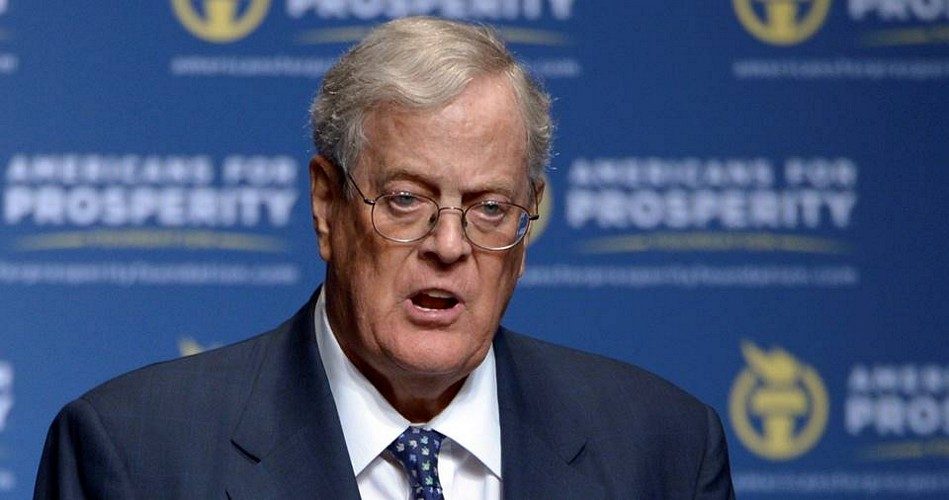
In a move that should surprise precisely no one, the Koch political network has informed donors that they will not support President Donald Trump — or any other candidate — in the 2020 presidential elections. While the network still expects to be active in down-ticket races for the Senate and House of Representatives, they will not weigh in on the presidential race. The organization also chose not to back Trump in 2016.
Koch network spokesman James Davis said the network is planning to make “significant investment to support policy champions in Senate, House and state races, build broad-based policy coalitions and to launch a major new initiative to fight poverty in America.”
“This is where we can make the biggest difference for millions of Americans,” Davis concluded.
The Republican National Committee (RNC) probably wasn’t expecting much Koch Brothers’ support in the next presidential election anyway. In August, they sent a letter to donors critical of the Koch organization after Charles Koch suggested that the network might begin to support Democrats. “Some groups who claim to support conservatives forgo their commitment when they decide their business interests are more important than those of the country or Party. This is unacceptable.” The same letter claimed that the GOP had “been prepared for this for years.”
In a January 2 e-mail to donors, the Koch network laid out its policy priorities for 2019, many of which sound as if they were written by Democrat Speaker of the House Nancy Pelosi. Among those priorities are income inequality, education initiatives, overhauling the criminal-justice system, and searching for a more permanent answer for undocumented immigrants who came here as children, known colloquially as “Dreamers.”
Trump and the Kochs have been at odds for some time now. At a meeting of donors last summer, some senior Koch network officials criticized what they called a “tremendous lack of leadership” in the Trump administration, further saying that “the divisiveness of this White House is causing long-term damage.”
President Trump responded on Twitter calling the Koch network “highly overrated” and “a total joke.”
“I never sought their support because I don’t need their money or their bad ideas,” Trump announced last July. “They love my Tax and Regulation cuts, Judicial picks and more. I made them richer. Their network is highly overrated. I have beaten them at every turn.”
Even with the animosity between them, Trump and the Koch network have been able to partner on several issues since Trump took the White House, among them tax-cuts, criminal-justice reform, and judicial nominees. During the government shutdown, when the president proposed a temporary amnesty for the so-called Dreamers, the Koch network supported the move, calling it “an important first step toward a real deal.”
But, at best, Trump and the Koch network enjoy a type of “love-hate” relationship. And it’s more hate than love. Trump has called the network “a total joke in real Republican circles.” While the White House maintains ties to the Koch network on issues such as tax cuts and immigration, there is little love lost between the president and the Kochs.
In a July tweet, the President attacked the Kochs, saying, “the globalist Koch brothers, who have become a total joke in Republican circles, are against Strong Borders and Powerful Trade. I never sought their support because I don’t need their money or bad ideas.”
The Kochs have also shown distain and frustration with Trump for his trade policy and what they see as his divisive rhetorical style.
Once a left-wing boogeyman for, among other things, supporting Wisconsin Governor Scott Walker in his fight against state employee unions and the unsuccessful attempt to recall him in 2012, the Kochs were also supporters of the Tea Party Movement, especially in their opposition to the Affordable Care Act, a.k.a. ObamaCare. But in recent years, the Koch organization has moved to the center and has hinted that they may begin to reach out to Democrats.
Last July, Charles Koch told Politico, “I don’t care what initials are in front of or after somebody’s name — I’d like there to be many more politicians who would embrace or have the courage to run on a platform.”
But more and more, that “platform,” as far as the Kochs are concerned, is about their own self interests and any politician, Democrat or Republican, who will support them.
President Trump proved in 2016 that he didn’t need the Kochs or the baggage that comes with their support. One of the main reasons that voters chose Trump is that they saw him as a person with his own money, who didn’t owe donors such as the Kochs anything. Even though their funds and their support could help in 2020, it’s for the best that the president doesn’t become beholden to them.
Photo of David Koch: AP Images




